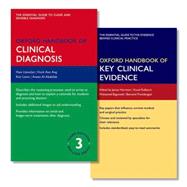Two titles from the bestselling Oxford Handbook series are available together in this great value pack.
Now revised for its third edition, the Oxford Handbook of Clinical Diagnosis provides a concise and practical summary of the reasoning processes behind clear and confident diagnosis. The handbook is set out systematically with symptoms and signs through each specialty, and includes a detailed description of the basis of logical evidence-based differential diagnosis.
This new edition has been updated with clearer diagrams and brand new images. Including rarer diagnoses alongside the common conditions, and vital information about longer-term management alongside the initial treatments, this handbook will ensure your excellence and confidence no matter what signs and symptoms your patient presents with. Providing practical help when dealing with problems outside your area of expertise or with unforeseen situations, you can be sure that this handbook will be your perfect companion to clear and confident diagnoses throughout your medical career.
The Oxford Handbook of Key Clinical Evidence provides an alternative to the burgeoning repositories of trial data for students, trainees and researchers looking for the key evidence affecting medical practice. Recognising the growing importance of evidence-based medicine (EBM) to both study and practice of medicine and surgery, the editors have aimed to provide a quick-reference text which presents the key data, facts and evidence informing medical and surgical practice on a daily basis.
Introductory chapters give the 'uninitiated' reader a firm footing in the history of EBM and its current importance within medical science. Readers are introduced to the current statistical methods and tools which are needed to analyse and critically assess trial data, providing a key for the terms and statistical methods encountered in the book and within medical research as a whole.
Leading figures in the major specialties have selected and summarised the most important modern trials, creating a two-page format for each study which distils the key information. Highlighted boxes identify the study type and evidence-level attained, while analysis of the key message and impacts of the trial firmly place the evidence into a practical setting for the reader. Key study features and results are examined, while the difficulties or problems associated with the trials are outlined.
This is essential reading for all medics with an interest in the fundemental evidence underpinning modern practice.








